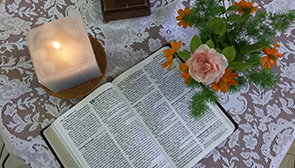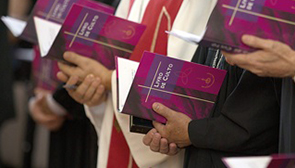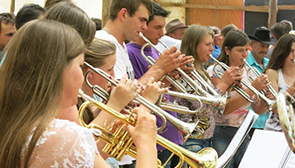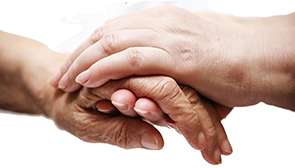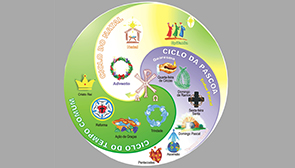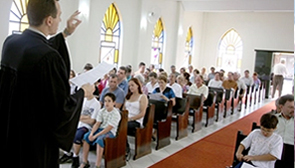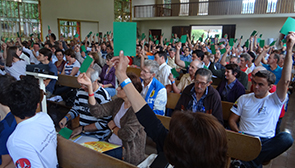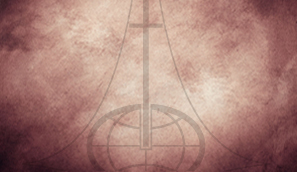 Bible Study 20
Bible Study 20
Ana Luiza Knaak Geppert (theology student) and Pastor Marli Brun from
the Gender and Religion Program - Faculdades EST
Translation: Marcia Blasi - IECLB
Text: Galatians 3.28; Joel 2.28
Sola Fide
Katharina Schütz Zell
God's action through faith
Katharina Schütz Zell believed in her right to preach in the church. By faith she knew that the Spirit of God (Ruah) dwelt in her, according to the biblical word of Joel 2.28 that states: “And afterward, I will pour out my Spirit on all people. Your sons and daughters will prophesy”. How can we silence when Ruah lives in
us?
Biblical-theological knowledge made Katharina know that people are justified only by faith and not through works. Today we announce that human works, especially laws, cannot restrict or deny a person's vocation for gender reasons. By faith, women and men are just people (Rom. 1:17). This faith is not an exercise in piety. It is a gift received from God that makes us live in communion and love, breaking with all forms of exclusion. It is a faith that makes us see the other person and ourselves, as an image and likeness of God. In Katharina’s interpretation of the Lord’s Prayer, she speaks of God as a grandfather and as a mother who is happy to breastfeed.
For faith in the fight for rights
Confident of Ruah's actions in her life, Katharina wrote to the Bishop asking him to change the rules (laws) of the church so that women could also preach. Her writing was grounded biblically with words like those of the apostle Paul to the Galatian community: “There is neither Jew nor Gentile, neither slave nor free, nor is there male and female, for you are all one in Christ Jesus.”(Gal 3:28).
When Katharina defended the right of women to preach in the church, she knew that women and men participated in the Jesus movement and contributed to the building of the first Christian communities. Women (and not just men) became disciples, apostles, missionaries, preachers, deacons, prophetesses.
The importance of women's participation and leadership was recognized by Jesus, but veiled and denied by later traditions. When the church ceased to be a movement and became an institution, the Christian logic of gender equality and justice was left behind and replaced by the exclusionary, sexist, hierarchical, patriarchal logic, typical of the world at that time. In the organization of the Christian church, male supremacy and submission of women prevailed. Thus, women who held any position or religious leadership came to be disregarded or considered heretical.
In the Middle Ages, women had little access to public spaces. Some, like Katharina Schütz Zell, were lucky enough to have access to education due to their family social position. Theological training spaces, for work in the church, could be accessed exclusively by men. Katharina not only defended her right to a protagonist participation of women in the church, but also testified to her faith through her writings, preaching (when possible), working in the community building, welcoming refugees, hosting the reformers Zwínglio and Ecolampándio in her house, among others.
In the Reformation movement, Katharina Schütz Zell was one of the examples of women who broke with the standards of submission imposed by society and religion at the time. She married Mateus Zell, a priest at the cathedral in Strasbourg who, by adopting the theology of the Reformation, was excommunicated by the bishop. The couple worked together to establish the Theology of Reformation in their city. Even before she got married, Katharina was an active leader in her community, within the limits historically established by the church. The right to preach, defended by her, became a reality in some churches from the Reformation movement, only in the 20th century. Still other churches continue to define the place of women as a place of sub-mission.
May we always remember that faith is trusting in God, it is finding refuge in our afflictions, strength to fight. In this time, more than ever, may we be Katharinas, and that our faith, like hers, does not inert, but faith that puts us into action for love, justice and peace.
To reflect:
What does salvation by faith mean to you?
What does it mean to your community?


